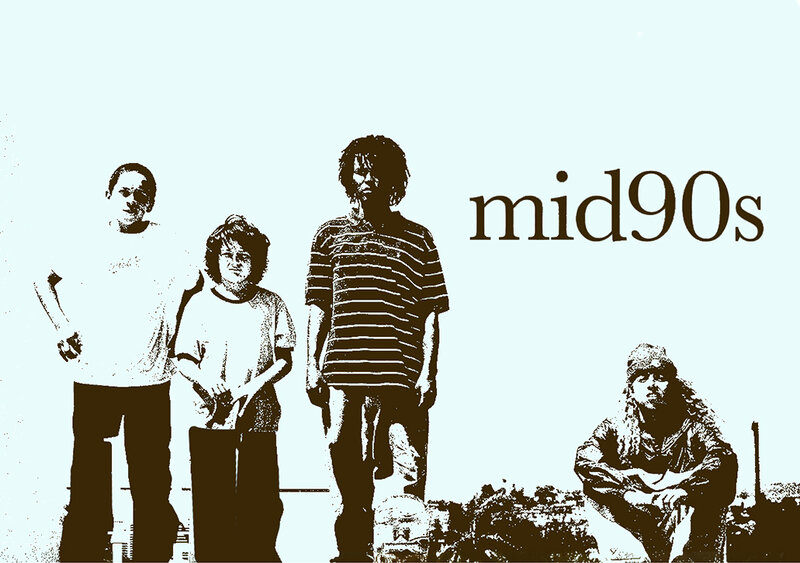
Written and directed by Jonah Hill, Mid90s is an authentic coming-of-age story about a young teenager named Stevie (Sunny Suljic) looking for a family that he misses at home. The film opens with a jarring scene as Stevie bursts into the frame, thrown into the hallway by his half-brother Ian (Lucas Hedges), who frequently uses Stevie as a punching bag. Their single mom Dabney (Katherine Waterston) is too busy working to provide much supervision.
Stevie finds a brotherhood in a group of skateboarders: Ray (Na-kel Smith), Ruben (Gio Galicia), and two kids who go by nicknames, “Fuckshit” (Olan Prenatt), derived from his frequent response, and the video camera-carrying “Fourth Grade” (Ryder McLaughlin). Ray is the unofficial leader of the group and the best skater. Ruben, who had been the youngest of the group, attempts to show Stevie the way to behave, telling him not to thank people and not to get excited about his first time in a car without an adult, but his sweetness and awe at new things are what make Stevie so endearing. However, Ruben sees Stevie as a rival to his standing and friction between them grows. Issues also arise between Ray, as he chats with potential sponsors, and “Fuckshit,” who just wants to party.
Being skateboarders, they attempt dangerous stunts and being young, they make questionable choices. Hill sets up one, a jump over a gap in a roof, that creates great tension not only from if they will make it but if they will even try it. Hanging with older boys leads Stevie to rites of passage such as first times with alcohol, drugs, and girls. Dabney wants Stevie to stay away from his friends, but she holds little sway with him.
As a writer, Hill creates scenes that are equal parts familiar and fresh, especially if one grew up around the time. The characters, brought to life by the talented cast of young actors, are completely believable in their behavior and choices. Suljic, in particular, is a standout and his lack of mention during awards season reveals an ageism bias. Hill’s direction is also deserving of praise. In addition to his cast selections, his collaborating with director of photography Christopher Blauvelt in staging of shots and editor Nick Houy in cutting the film, like showing time pass at a house party. The sequence towards the end of the film of the boys driving is one of the best of the year.
The video has been given a 1080p/MPEG-4 AVC encoded transfer at 1.33:1. Shot on Super 16, the image has strong primary colors and blacks are solid. A lot of interiors are low lit. Details are sharp in the foreground but the depth of field is limited so focus diminishes in the background. Surprisingly for a film from last year, scratches and specks appear, like the scene when Stevie has his first cigarette with Ruben. The audio is available on DTS-HD Master Audio 5.1. Dialogue is clear. The ’90s songs and the score by Trent Reznor & Atticus Ross fill the surrounds, as does minimal ambiance. The extras include an audio commentary by Hill and Blauvelt, who deliver an engaging conversation about creating the film and four short Deleted Scenes (HD, 3 min).
Mid90s created such an intriguing portrait of its main character that I hope Hill revisits him like François Truffaut did with Antoine Doinel. But whatever Hill wants to write and direct next, he has earned my trust because of the high quality work he has created here. The Blu-ray accurately captures to the film’s lo-fi quality.